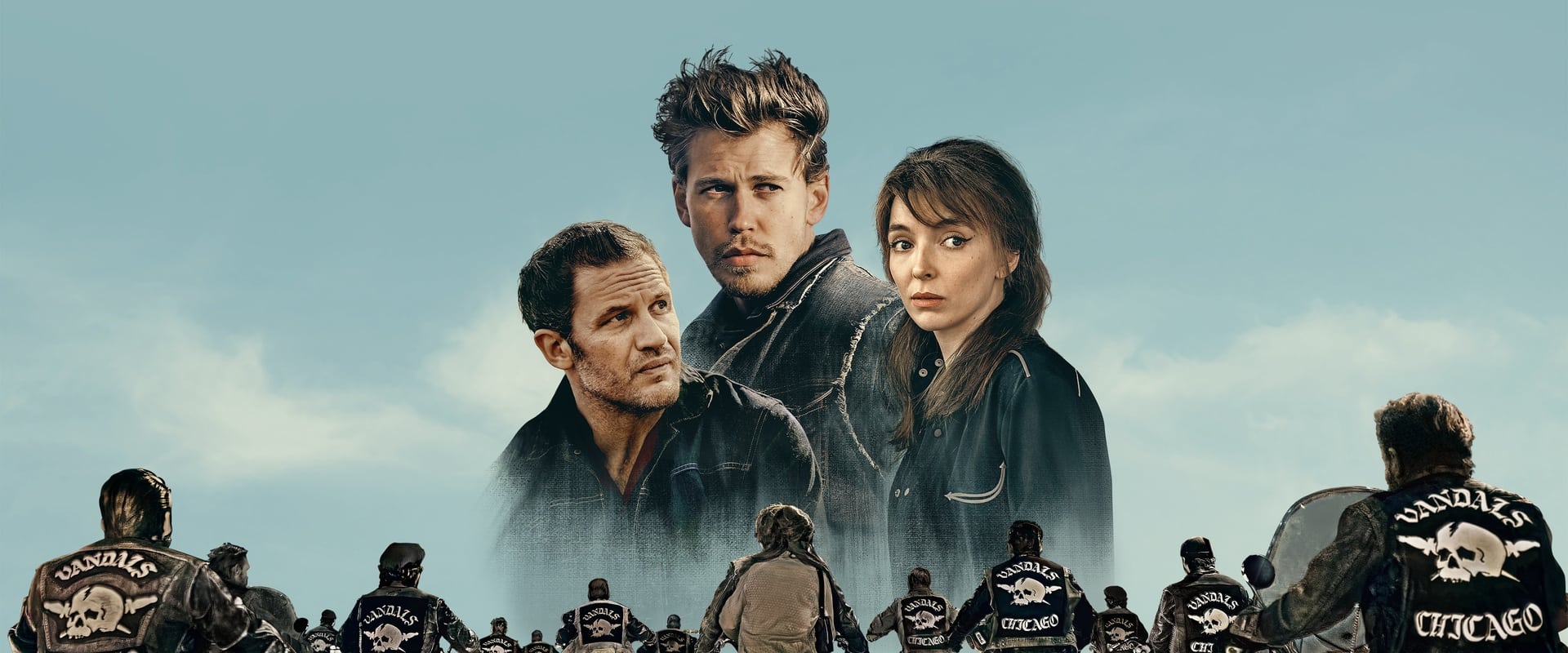The gangs of America have always gone Hollywood sooner or later, and in The Bikeriders, Jeff Nichols opens the throttle and lets the Vandals Motorcycle Club—outlaws ripped from Danny Lyon’s mythic photographs—tear through the screen like thunder in church. Here’s a picture that understands motorcycles as not just machines but battered totems of belonging, and it wears its period cool with such nonchalance you half expect the film stock itself to start rumbling.
Nichols isn’t making a dry documentary—thank God. He snatches up those Polaroids of the Outlaws and the Hells Angels, shakes off the dust, and hands us a stylized reverie: all leather jackets and cigarette smoke, poised somewhere between memory and fantasy. The story, loosely laced together with the stitched scars of a thousand American counterculture dreams, follows not so much the rise and fall of a club but rather the pulse—the desperate, beautiful, dirty need—to belong. This isn’t history; this is muscle and menace and heartbreak, with a golden tinge of nostalgia right out of a rebel’s scrapbook.
At the core is Jodie Comer’s Kathy, the club’s accidental archivist and perhaps its only real conscience. Comer gives us Kathy not as a breathless moll but as a woman forever caught on the lip of the precipice, loving a man (Austin Butler’s Benny) who can barely love anything more than the roar of his bike. Comer’s performance is a marvel of emotional athletics—she aches, she doubts, she wants, she survives. I almost wanted to smack Benny upside the head and tell him to wake up. Her vocals are all Midwestern lilt and exasperated heart—and through her, we watch the Vandals transform from scrappy family to a clan on the edge of obliteration. It’s a performance that splinters and radiates through the picture; she isn’t just riding pillion, she’s holding the handlebars of the whole film.
Butler’s Benny is motorcycle Zen incarnate—silent, rakish, with the kind of beauty that spells nothing but trouble for men and women alike. Butler doesn’t just act so much as smolder; he makes inertia feel like a philosophy. You don’t know whether to root for him to find freedom or just finally tumble into the arms of the woman who’s already saved him a dozen times. He’s the heartbreak kid of the open road, too soft to be truly cruel, too hard to ever settle down. Next to him, Tom Hardy plays Johnny, the club’s patriarch with a jaw set in the moral quicksand of leadership—think Brando gone to seed, a king without a kingdom who knows the gun in your boot is only as loyal as the man wearing it.
Nichols arranges his ensemble like a barroom menagerie—Michael Shannon, Norman Reedus, and a dozen others thicken the world into something you can almost smell: grease, sweat, faded denim, and the whiff of too many hopes curdling in the wind. The Vandals live, drink, brawl and dream not as symbols but as raucous, big-hearted fools—tragic in their cravings for unity that inevitably sours. The violence here isn’t stylish; it’s squalid and awkward, like a fight that’s gone on too long but nobody knows how to leave.
Nichols, who’s always had a magician’s touch for atmosphere, drenches the screen in deep, honeyed twilight and cigarette haze. The cinematography does for the Midwest what Altman once did for Nashville—transforming tired roadside America into a kind of battered Valhalla. You feel the ache of every rearview mirror, the longing in every string of neon. Those vintage bikes don’t just sparkle, they sweat—a love letter to the battered machinery of a lost America.
And that soundtrack—jukebox blues, rebel yells, the kind of music that makes you want to wear sunglasses at midnight and never apologize. Nichols needles the nostalgia just right, never drowning us in pastiche, always suggesting the soundtrack was written in some eternal roadhouse that never quite closes.
It’s a movie with a lazy river pacing—some will call that slow, but to me, every lull is a drag on a cigarette, a night in the parking lot. Reflection isn’t just permitted; it’s demanded. The film isn’t interested in giving everyone a fifteen-minute emotional arc and a backstory as thick as an AA confession. The club is a group—you win some, you lose some, and that’s the story.
In the end, The Bikeriders rides the line between exultation and resignation. This isn’t a documentary; it’s a waking dream of America’s dirty, beautiful underbelly—a place where love clashes with loyalty, and nobody comes out clean. If you want to know how it felt to live on the edge of belonging, this movie gets you closer than any history book.
It left me exhilarated, a little bruised, and desperate to find my own battered jacket and hit the highway—not for freedom, but for the riotous, obstinate hope of finding a tribe willing to love you just enough. The Bikeriders isn’t just a movie about a motorcycle club; it’s a grand, messy, lonesome song about needing to be part of something—even if that something is doomed to ride off the edge of the map. In short: see it, and take the long way home.


